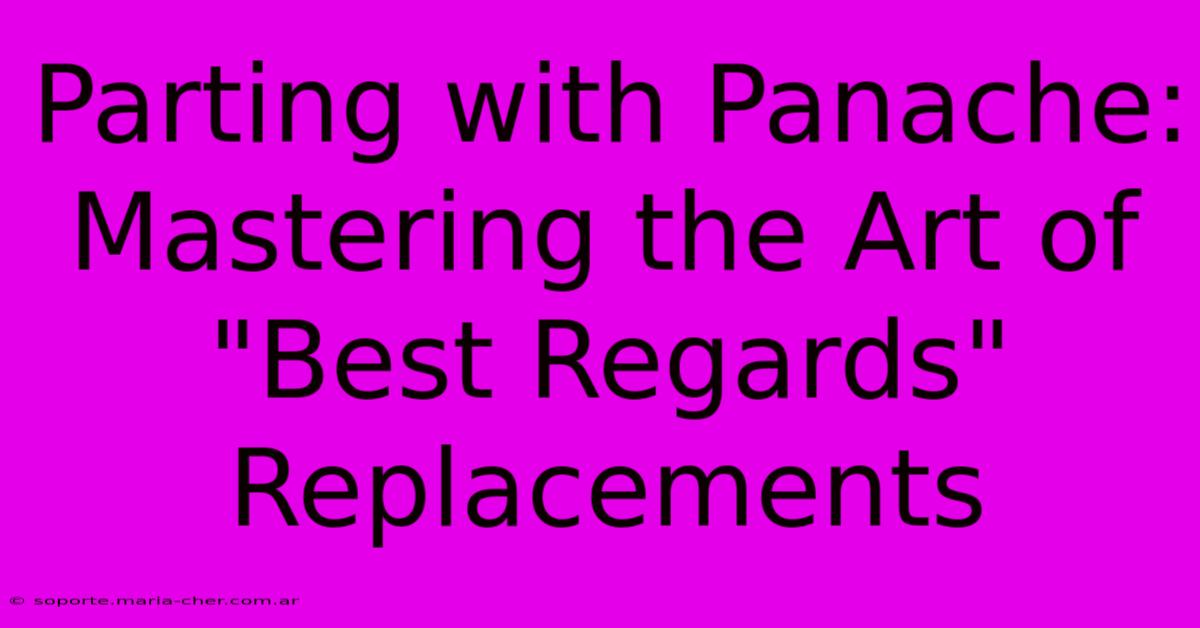Parting With Panache: Mastering The Art Of "Best Regards" Replacements

Table of Contents
Parting with Panache: Mastering the Art of "Best Regards" Replacements
Saying goodbye in professional communication is more than just slapping a closing at the end of your email. It’s a final flourish, a lasting impression. While "Best regards" is a perfectly acceptable closer, sometimes you need something with a bit more panache. This guide dives into the art of choosing the perfect sign-off, helping you craft a closing that reflects your relationship with the recipient and the tone of your communication.
Why Go Beyond "Best Regards"?
"Best regards" is safe, it's polite, and it's widely understood. But it can also be…bland. Using varied closings demonstrates attention to detail, showcases your personality (professionally, of course!), and can subtly influence the recipient's perception of you. A well-chosen sign-off can enhance professionalism, express warmth, or even subtly assert authority, depending on your goal.
The Context Matters
Before we explore alternatives, remember context is king. The ideal closing depends on several factors:
- Your relationship with the recipient: A casual "Cheers" might be appropriate for a colleague you know well, but entirely inappropriate for a potential client.
- The tone of your email: A formal business proposal requires a formal closing; a quick follow-up email to a friendlier contact might allow for more informality.
- Your company culture: Some organizations have strict guidelines for professional communication. Always adhere to these internal protocols.
Elegant Alternatives to "Best Regards"
Here are some sophisticated and effective alternatives, categorized for easier selection:
Formal Closings:
- Sincerely: This classic remains a reliable choice for formal communications, projecting respect and professionalism.
- Respectfully: Use this when expressing deference or addressing someone of higher authority.
- Cordially: This conveys warmth and politeness while maintaining a professional tone.
- Kind regards: A slightly warmer alternative to "Best regards."
- With appreciation: This is perfect when expressing gratitude for their time or assistance.
Semi-Formal Closings:
- Warmly: This conveys friendliness and approachability.
- All the best: This is a versatile option suitable for most professional communications.
- Thank you: Ideal when you've received help or are concluding a transaction.
Informal Closings (Use with Caution):
- Cheers: Appropriate for colleagues you know well, but generally avoid with clients or superiors.
- Thanks: Short, sweet, and suitable for informal communication.
- Talk soon: Implies a future interaction and works well with colleagues.
Avoiding Closing Faux Pas
While expanding your closing vocabulary is beneficial, avoid these common mistakes:
- Overly casual closings in formal settings: Using "Cheers" in an email to a CEO will likely not be well-received.
- Inconsistent closings: Maintain consistency throughout your communication with a given individual.
- Using inappropriate abbreviations: Avoid text-speak and abbreviations unless explicitly appropriate.
Mastering the Art of the Perfect Sign-Off
Choosing the right closing is a nuanced art, not a science. Pay attention to your audience, the context of your message, and your relationship with the recipient. By thoughtfully selecting your sign-off, you can add a polished touch to your communication and leave a positive, memorable impression. Mastering this subtle detail elevates your professional communication to a new level of sophistication. So, next time you hit "send," remember to choose your closing with panache!

Thank you for visiting our website wich cover about Parting With Panache: Mastering The Art Of "Best Regards" Replacements. We hope the information provided has been useful to you. Feel free to contact us if you have any questions or need further assistance. See you next time and dont miss to bookmark.
Featured Posts
-
Make A Lasting Impression The Art Of The Perfect Email Signature Quote
Feb 09, 2025
-
10 Cinematic Masterpieces That Will Blow Your Minds Cool
Feb 09, 2025
-
Canon G Iii Ql The Ultimate Guide For Film Photography Enthusiasts
Feb 09, 2025
-
Unveiled The Canon Rf 35mm F 1 2 L Usm Clarity Redefined
Feb 09, 2025
-
Necklace Noir Jewellers Vs Jewelers A Suspenseful Spelling Thriller That Ll Captivate Your Grammar Senses
Feb 09, 2025
